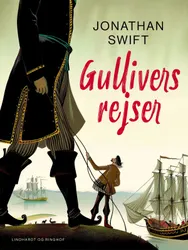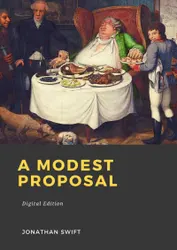A Modest Proposal For preventing the Children of Poor People From being a Burthen to Their Parents or Country, and For making them Beneficial to the Publick, commonly referred to as A Modest Proposal, is a Juvenalian satirical essay written and published anonymously by Jonathan Swift in 1729. Swift suggests that the impoverished Irish might ease their economic troubles by selling their children as food for rich gentlemen and ladies. This satirical hyperbole mocked heartless attitudes towards the poor, as well as British policy toward the Irish in general. In English writing, the phrase "a modest proposal" is now conventionally an allusion to this style of straight-faced satire. Swift goes to great lengths to support his argument, including a list of possible preparation styles for the children, and calculations showing the financial benefits of his suggestion. He uses methods of argument throughout his essay which lampoon the then-influential William Petty and the social engineering popular among followers of Francis Bacon. These lampoons include appealing to the authority of "a very knowing American of my acquaintance in London" and "the famous Psalmanazar, a native of the island Formosa" (who had already confessed to not being from Formosa in 1706). This essay is widely held to be one of the greatest examples of sustained irony in the history of the English language. Much of its shock value derives from the fact that the first portion of the essay describes the plight of starving beggars in Ireland, so that the reader is unprepared for the surprise of Swift's solution when he states, "A young healthy child well nursed, is, at a year old, a most delicious nourishing and wholesome food, whether stewed, roasted, baked, or boiled; and I make no doubt that it will equally serve in a fricassee, or a ragout."

A Modest Proposal (Hero Classics)
Jonathan Swift
book
Gulliver's Travels : Jonathan Swift's Timeless Adventure in Distant Lands
Jonathan Swift, Zenith Crescent Moon Press
book
Gulliver's Travels
Jonathan Swift
audiobookbook
10+ Masterpieces of Classic Adventures Collection : The Call of the Wild, Twenty Thousand Leagues Under the Sea, Heart of Darkness, The Lost World and others
Jack London, Jules Verne, Robert Louis Stevenson, Jonathan Swift, Daniel Defoe, Arthur Conan Doyle, O. Henry
audiobook
The Classic Collection of Dystopias : Animal Farm, 1984, We, The Iron Heel, Gulliver's Travels
Jonathan Swift, Jack London, Evgeny Zamyatin, George Orwell
audiobook
The Classic Collection of Dystopias. Illustrated : Animal Farm, 1984, We, The Iron Heel, Gulliver's Travels
Jonathan Swift, Jack London, Evgeny Zamyatin, George Orwell
book
Gullivers rejser
Jonathan Swift
book
Gulliver's Travels
Jonathan Swift
book
A Modest Proposal
Jonathan Swift
book
Una Modesta Proposición :
Jonathan Swift
audiobook
A modest proposal
Jonathan Swift
book
Library of Masterpieces - 100 Books to Read in a Lifetime
illiam Shakespeare, Fyodor Dostoevsky, Louisa May Alcott, Miguel de Cervantes, John Milton, Jane Austen, Charlotte Brontë, Emily Brontë, Anne Brontë, William Makepeace Thackeray, George Eliot, Charles Dickens, Thomas Hardy, Jonathan Swift, Daniel Defoe, Joseph Conrad, Robert Louis Stevenson, Mary Shelley, Bram Stoker, Arthur Conan Doyle, Wilkie Collins, Oscar Wilde, T. S. Eliot, D. H. Lawrence, James Joyce, Virginia Woolf, E. M. Forster, Evelyn Waugh, Aldous Huxley, George Orwell, H. G. Wells, Lewis Carroll, Frances Hodgson Burnett, Kenneth Grahame, C. S. Lewis, Malcolm Lowry, Ford Madox Ford, Mark Twain, Jack London, Herman Melville, Ernest Hemingway, Jack Kerouac, Nathaniel Hawthorne, Edith Wharton, Walt Whitman, Kate Chopin, Harriet Beecher Stowe, Neale Hurston, Richard Wright, Raymond Chandler, Dashiell Hammett, F. Scott Fitzgerald, John Steinbeck, William Faulkner, Margaret Mitchell, Sylvia Plath, Carson McCullers, L. Frank Baum, L. M. Montgomery, Leo Tolstoy, Ivan Turgenev, Nikolai Gogol, Johann Wolfgang von Goethe, Friedrich Nietzsche, Thomas Mann, Franz Kafka, Erich Maria Remarque, Albert Camus, Marcel Proust, Jules Verne, Victor Hugo, Gustave Flaubert, Stendhal, Alexandre Dumas, Henrik Ibsen, Rudyard Kipling, Homer, Sophocles, Virgil, Laozi, Sun Tzu, Plato, Marcus Aurelius, Dante Alighieri, Niccolò Machiavelli
book
